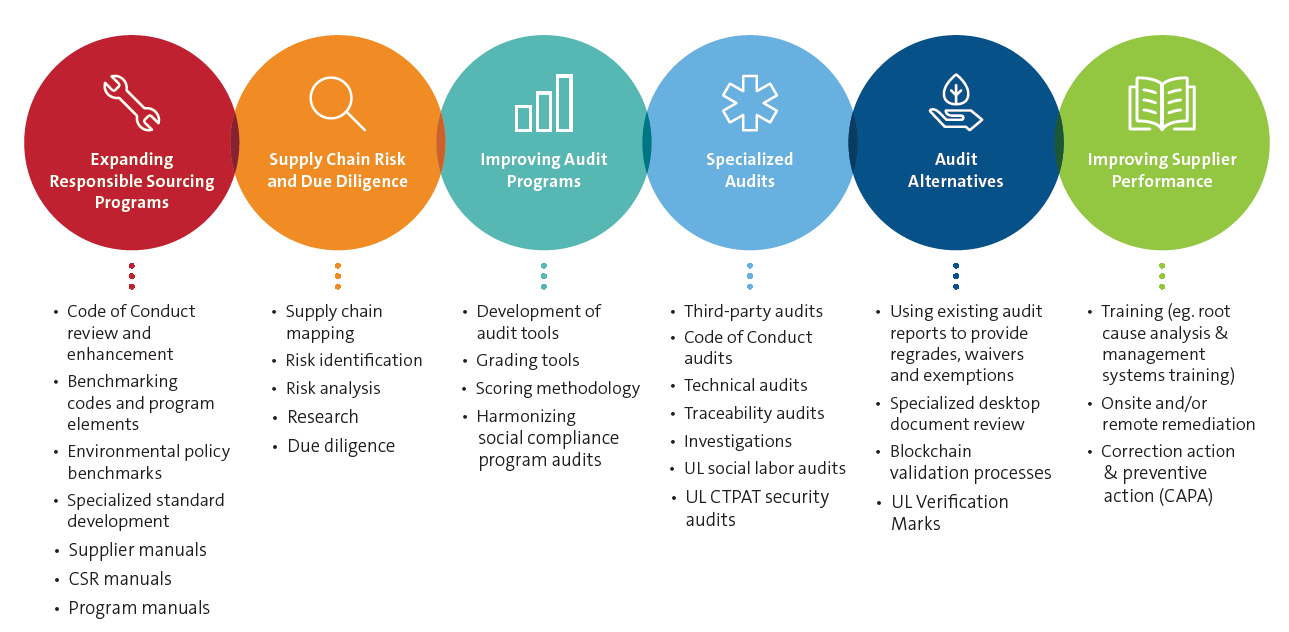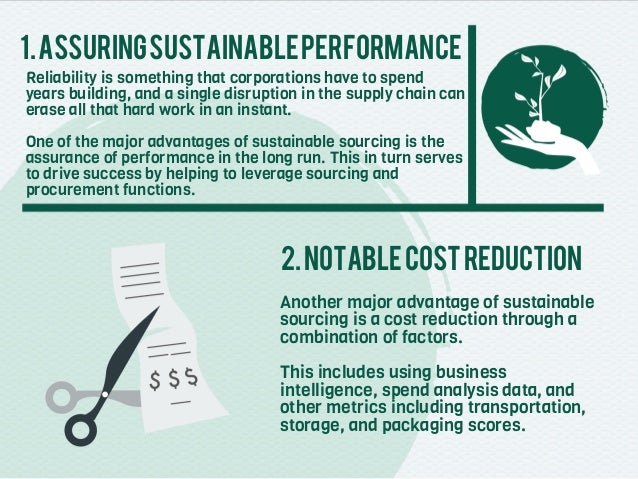- Why Sustainable Sourcing Is Good For Business Entities
- Why Sustainable Sourcing Is Good For Business Customers
- Why Sustainable Sourcing Is Good For Businesses
- Why Sustainable Sourcing Is Good For Business Marketing
Over the past two decades, sustainability has become more than a fad or just a buzz word. Research shows that sustainability has real business benefits when conscientiously integrated into business operations. Six major advantages for practicing sustainability are: 1. Improved brand image and competitive advantage. Surveying more than 53,000 U.S. The CEO Magazine is more than a business title; it’s a source of information, inspiration and motivation for the world’s most successful leaders, executives, investors and entrepreneurs. Our content creates conversations, our voice is the one that matters. Increasingly, businesses are making strategic decisions around the type and extent of their corporate sustainability policies. In addition to environmental and social benefits, companies that incorporate sustainability into decision-making processes can reap significant financial advantages and attract more interest from investors, which is a key to long-term profitability.
An Accenture report titled, “Why a Sustainable Supply Chain is Good Business,” noted that in a sustainability effort, a beverage company was able to decrease the amount of fuel used for distribution trucks by 1.4 million liters (a significant cost savings), thereby reducing CO2 emissions by 3,900 tons. Here we will look at some of the myths about sustainability and why sustainable actions are good for the environment and for your business. Four Myths About Sustainability Myth 1: It’s a Cost We Can’t Afford. In every organization, there is often a fundamental business reason for being more sustainable.
The employment outlook for professionals seeking new and emerging sustainability careers is bright. That’s because sustainability is increasingly becoming a critical part of business strategy and operations.
In 2014, 43 percent of executives said their companies seek to align sustainability with their overall business goals, mission, or values—up from 30 percent in 2012—according to McKinsey Global Institute.
Major brands such as Apple, Walmart, Nike, and almost every other Fortune 500 company have led the way, making serious commitments to sustainability efforts, including:
- Energy-use reduction
- Resource conservation
- Recycling
- Pollution prevention
- Waste elimination
- Transportation efficiency
- Building design
- Human rights and community development
Demand for Sustainability Skills
A key driver of these commitments is the strong financial benefit of instituting sustainability practices. But to achieve their sustainable business goals, organizations in every sector—from pharmaceuticals to automotive to food production—need qualified professionals with the skills to take on the challenges of the sustainable revolution. From McKinsey’s 2014 Sustainability & Resource Productivity report:
Why Sustainable Sourcing Is Good For Business Entities
“If the scale of the resource challenge is unprecedented, so, too, is the know-how available to address it… Companies that seek to get and stay ahead need to find the right people with the right skills; conventional practices and talent may not be enough.”
Employers need professionals who can:
- Apply systems thinking
- Implement and manage sustainable business practices
- Help balance budgets to meet the triple bottom line
- Understand energy production, consumption, and environmental impact
- Apply technology and information systems that support sustainable development in an organization
- Promote sustainable strategies inside the organization and beyond

Professionals with sustainability skills have a competitive advantage in the job market and are in a prime position to be hired to develop sustainable practices in offices, manufacturing facilities, hospitals, retail stores, schools, government, power plants, wastewater-treatment plants, and other workplaces.
Sustainability is a diverse field that encompasses a wide variety of professionals who may not have “sustainability” in their job descriptions. Sustainability professionals can be business managers, distribution managers, production managers, accountants, compliance officers, and more, according to the Bureau of Labor Statistics.
Students and graduates of the Sustainable Management program are pursuing careers in:
- Building energy consulting
- Marketing and sales
- Renewable energy
- Retail
- Solar installation
Rise of the Sustainability Leader
In the 2015 article “Leading in a World of Resource Constraints and Extreme Weather,”Harvard Business Review described three megatrends in corporate sustainability: resource constraints and rising commodity prices; climate change and extreme weather; and radical, technology-driven transparency—all issues that require new leadership and prompt the “rise of the Chief Sustainability Officer.”
“The development of new skills, like systems-thinking mindsets, is lagging far behind where we need to be.”—Harvard Business Review, 2015
The number of chief sustainability officers (CSOs) tasked with driving “the formulation and execution of an organization’s sustainable strategy” has grown substantially over the past few years, according to a Harvard Business School white paper. The number of companies with full-time sustainability officers doubled between 1995 and 2003, and doubled again between 2003 and 2008. Other sustainable management occupations can be expected to follow this trend as well.
Sustainable and Environmental Management Job Titles and Salaries
Why Sustainable Sourcing Is Good For Business Customers
Among professionals who are primarily responsible for sustainability in their organizations, job titles, descriptions, and salaries vary considerably and are usually dependent on prior work experience. Location may also be a major factor in the number and type of sustainability positions available.
In general, sustainability professionals in managerial roles help their organizations lessen negative impacts on the environment and community by advising other leaders on what should be improved. They may also develop sustainability initiatives, put them into action, and supervise those working on the projects.
The average salary for a sustainability manager is $72,706, according to PayScale’s 2015 national salary data. Professionals with advanced skills and experience in sustainable management can make more than $100,000 per year.
With a Bachelor of Science in Sustainable Management, a graduate can pursue positions such as:
- Sustainability specialist
- Solar operations surveyor
- Sustainability consultant
- Energy and LEED analyst
- Social compliance analyst
- Zero-waste program manager
- Renewable energy analyst
- Sustainable design coordinator
- Environmental analyst
CAREER SPOTLIGHT
Sustainability Specialist
According to O*NET, sustainability specialist is considered a new and emerging “Bright Outlook” occupation projected to have 100,000 or more job openings between 2016 and 2026. Sustainability specialists are responsible for addressing organizational sustainability issues, such as waste-stream management, green building practices, and green procurement plans, and made a median salary of $69,040 in 2016.
With a Master of Science in Sustainable Management, a graduate can pursue occupations such as:
- Chief sustainability officer
- Director of sustainability
- Sustainability project manager
- Senior environmental programs specialist
- Supply chain manager, sustainability and energy
- Director of sustainable manufacturing innovation
- Sustainability coordinator
- Vice president of corporate social responsibility and sustainability
- Director of global environmental affairs
CAREER SPOTLIGHT
Chief Sustainability Officer
According to O*NET, chief sustainability officer (CSO) is a new and emerging occupation. CSOs communicate, develop, or execute sustainable business strategies and help their organization profit from the push to become more sustainable. The median salary for a CSO in 2016 was $181,210.
Based on salary data from Recruiter, CSO salaries range between $144,000 and $216,000, and the average annual salary is $183,800. The data also show that compensation for CSOs increased by more than 30 percent from 2004 to 2010.
In the video below, Steve Howard, chief sustainable officer for IKEA, explains why zero waste, renewable investments, and other sustainable business practices have “gone from a nice-to-do to a must-do.”

TED Talk: Let’s Go All-In on Selling Sustainability

____
What’s next?
Explore
University of Wisconsin offers online bachelor’s and master’s degrees and certificates in Sustainable Management. Start your journey here.
Get Started
Find information about admissions and tuition costs for our programs.
Ask
Have questions about University of Wisconsin Sustainable Management? Contact an adviser at 1-877-895-3276 or learn@uwex.edu.
- Design
- Sourcing
- Procurement
- Project Management
- Logistics
Reliable Distribution
Our centralized warehouse and customer integrated supply chain solutions ensure accurate and on-time product delivery.
Group Purchasing
At Accuserv, we leverage the purchase volume, diversity, and scale of our customers to maximize the reduction of CapEx spend on the products we provide.
Consulting
Using industry best practices and resources, we have in-house design, specification, and procurement expertise across multiple product categories that develop tailored solutions for our customers.
Comprehensive Experience
Why Sustainable Sourcing Is Good For Businesses
For more than 20 years, our team has successfully developed long-term partnerships with some of the largest and most notable companies in the country, delivering products from coast to coast.
Products
Collectively, our dedicated teams have over 300 years of operational experience in and around the design, construction, and supply chain industries.

Why Sustainable Sourcing Is Good For Business Marketing
Providing Superior Service to Clients Across Markets
From food service to retail–we serve our customers with dedicated teams that specialize in their industries.
